The Cockerel











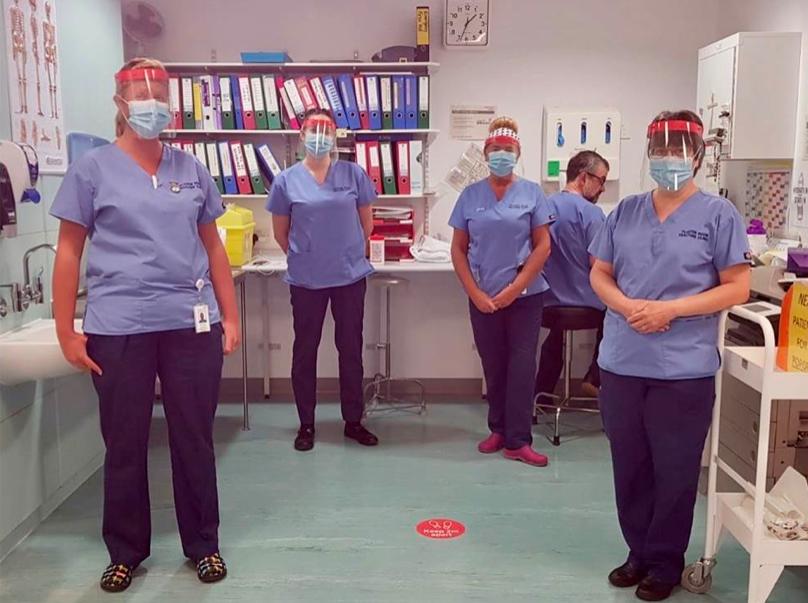


As Summer Term 2020 drew to a close and parents sent in a plethora of messages congratulating Bolton School on how well it had managed an almost seamless transition to virtual learning during lockdown, there was also reflection on how much the School had contributed to the local community and the NHS during the Covid-19 crisis.
There was much beneficence across the campus. The Junior Boys’ School produced much needed PPE equipment, producing 150 visors and at least 250 visor headbands. Mr. Winstanley explained: ‘For a time, we had two 3D Printers working 24/7 to produce as many visor headbands as possible. These were produced as part of a national effort and in conjunction with the National 3D Printing Society, who will hopefully be coming into Park Road this academic year to talk to pupils about additive manufacture. Alongside this project, pupils saw their class teacher using the 3D printing technologies to print headbands and face visors for the NHS as well as using TinkerCAD and the very same features they had been learning about in their own lessons, to adapt the Italian ‘Charlotte Valve’ to produce a valve that better fits British medical equipment. The finished products were then distributed to Intensive Care Units across Greater Manchester. Pupils seeing similar work to theirs having such a large impact across the country certainly added to their enthusiasm towards 3D Printing.’

One of his pupils, Zain Khan, now in Year 7, showed initiative and creative skills of his own by developing some well designed, cleanable and adjustable ear relievers which were gratefully received by staff in the stroke unit of the East Lancashire Hospitals NHS Trust.
The Junior Boys’ School usually holds a charity run in the Summer Term, but had to go virtual with their fundraising. Headteacher Mrs. Sue Faulkner explained: ‘We were of course disappointed not to be able to run our usual charity fun run as it is an enjoyable event and one which usually raises a lot of money for good causes. So, we decided to do a virtual ‘Around the World in 8 Days’ fun run instead. Each day, for just over a week, the boys and their families clocked up miles by running, walking or cycling as we sought to build up enough to circumnavigate the world. We didn’t quite get

round the world, but we did manage to raise just over £2,500 for local charity Bolton Hospice. We wanted to raise money for this local cause as we were aware that many smaller charities would not reach their fundraising targets this year as a result of COVID-19. The response from our boys and families was quite overwhelming.’
In the Senior Boys’ School, the Beekeeping Club donated jars of honey to Urban Outreach, who, with the support of Bolton Council, prepared food packages for those families most in need during the Covid-19 crisis. In addition, ‘Butchart’s Bradshaw Bees’, set up by DTE teacher Mr. Butchart, donated several more jars to the cause. As term ended, the School’s Charity Committee donated funds to a number of local charities with concerns about cash flow including Derian House, Urban Outreach, Emmaus Bolton, Zac’s Youth Bar, Fortalice, Bolton Hospice, Bleakholt Animal Sanctuary, Bolton Children’s Opportunity Group, Epilepsy Support UK, The British Lung Foundation, OddBalls Foundation, Cavell Nurses' Trust, Markland Hill Memorial Gardens campaign and Star Academies.
Across the schools, there were many acts of individual kindness as boys produced lots of thank you messages for the NHS and made sure elderly neighbours had the supplies they needed. Many pupils took part in the ‘Run for Heroes Challenge’, each raising £5 for the NHS as they ran 5km.
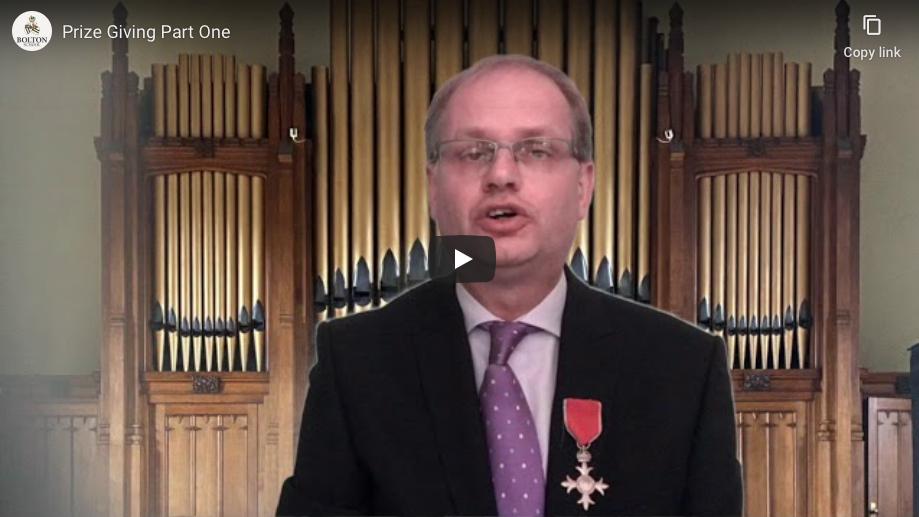
Prizegiving at Bolton School Boys' Division went virtual for 2020 as Covid-19 meant the country was in lockdown. Guest speaker Old Boy Ian Ross had agreed to attend the 2021 prizegiving in person and so it was Headmaster Philip Britton who led the online assembly, praising the collective effort of the school community during the last few months and lauding individual achievements throughout the course of the academic year.
The audience of boys, parents, governors, staff and friends of the school were encouraged to sing along to the School song
Forty Years On before three monitors reflected on their lockdown experiences. Ben Chowdhury played a piano piece before Mr. Britton read out the list of prizewinners. William Miles also offered musical accompaniment on the piano before the Headmaster gave a brief overview of the year mentioning how the Hockey team had enjoyed the new all weather pitch at Leverhulme Pavilion, the inception of the Rowing Club and its new home at Salford Quays, success in Water polo and Swimming competitions and the School's Concert Band winning a Platinum Award. Academically, there had been much success, but Mr. Britton made specific mention of a Bronze medal in the first Cambridge Chemistry Race and of the awarding of Gold,
Silver and Bronze medals and national selection for one boy in the Science Olympiads. Focusing on clubs and societies, he praised the success in local quizzing and Model United Nations competitions. He also spoke about the successful implementation of a new pastoral period.
The virtual assembly ended with the audience encouraged to join in the singing of Jerusalem and by a Vote of Thanks from next year's Captain, Charlie Griffiths.
You can re-live the virtual prizegiving assembly here:
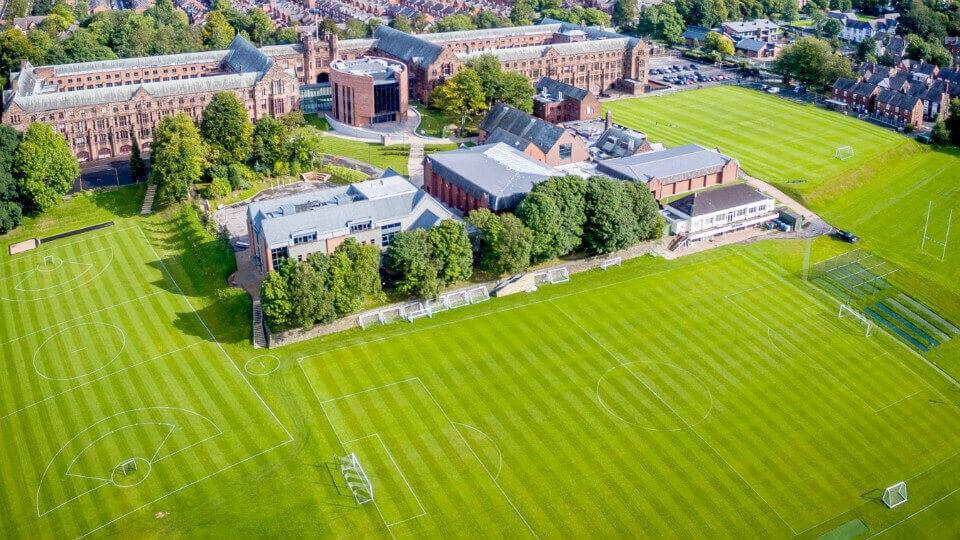
Part 1 - Introduction and the School song Forty Years On
Part 2 - Senior Monitors reflect on lockdown
Part 3 - Ben Chowdhury plays piano and Mr Britton awards prizes
Part 4 - Mr Britton awards more prizes
Part 5 - William Miles plays piano and Mr Britton reviews the year
Part 6 - Review of the Year, the singing of Jerusalem and the School Captain's Vote of Thanks

It was not the usual Results Day at Bolton School this year in August, particularly since the normal celebration of A Level achievements could not take place due to Covid-19 safety restrictions. Nonetheless, students were encouraged to make the most of their moment, no matter the strange global circumstances surrounding it.

Back in August, Philip Britton, Headmaster of Bolton School Boys’ Division, said: “We are lucky at Bolton School to have a large number of pupils and very stable results year on year, so that the process used to calculate the grades this year has produced outcomes very much in line with our expectations. The vast majority of the grades we submitted to the board have not been altered. If it was a normal year, we would be celebrating a strong set of results.
“I think it is important we do still celebrate with the young men getting their results this year. Lockdown came just as they had been revising for several months, as well as continuing to study new material, to do their



mock exams. They were doing those in the first week after half term, as the country was assimilating the emerging health issues as people returned from February trips abroad. They worked hard and that hard work has, in an unusual way, brought them a set of results to be proud of today.
“Although we cannot be together in school in quite the same way today I hope that everyone, in their own way, finds a means to mark a notable rite of passage in their education and life.”



Three quarters (75.3%) of grades awarded were in the A*-B category and more than nine out of ten grades (91.4%) were at A*-C. 17.5% of grades were at A* and almost half (49.4%) were either A* or A.
The percentage of students with facilitating grades (ABB) allowing access to the top universities was at 55%. The overall pass rate (A*E) for the full cohort of 99 boys was 100%.
The class of 2020 received their results by email and portal, rather than in person, and were wished a fond farewell from their tutors over the phone throughout the morning.
The afternoon was given over to safe and socially distant celebrations outdoors for those who wished to meet friends at School one last time as students.

After a tumultuous week for exam results in August, Year 11 boys at Bolton School celebrated an excellent set of GCSE results, which they received via email. The results saw 99.9% of papers being graded in the 9-4 (A*-C) category, 63% of grades in the 9-7 (A*-A) range and 39.4% of grades at 9-8 (A*). An impressive 19.3% of grades were at the very top level of 9. 75.2% of the cohort of 141 boys received at least 10 GCSEs that were graded A*-C and 77% of the group received at least 4 7s and 3 6s (A and B grades). The percentage of boys achieving ten 9-7 (A*-A) grades was at the highest rate in recent years at 31.9%, up from 21.5% the previous year. Eighteen boys achieved ten or more A* or 8/9 grades. On average, each pupil received 9.7 grades in the 9-4 category.


Back in August, Philip Britton, Headmaster of the Boys’ Division, said: “We celebrate some strong results with the boys today. Although they have been produced in a most unusual manner, with uncertainty until the last moment, for an individual boy they represent the end point of many years of hard work and commitment, right up to the mock exams that happened only weeks before lockdown.
“It is important for this year group to look forward. They began A level teaching remotely back at Easter and we are looking forward to welcoming them back to school in September to really press on with the next stage of their education and hopefully some much more usual exam and result day experiences in 2022!”

Two Sixth Formers at Bolton School have made a national shortlist of 20 students in this year’s Political Studies Association (PSA) Blog Competition, held in partnership with the FT and supported by UK Parliament. The Girls’ Division’s Zoe Grainger, a recent leaver, and Lucas Appleby in Year 13 in the Boys’ Division both made the cut.


Entrants were asked to answer the question “does the public expect too much of UK politicians?” in a blog style article in less than 600 words. Their writing was judged on how well they had shown organisation and structure, development of ideas, insight into the subject, creativity, evidence of further reading, clarity and style, as well as originality.
The competition received 198 submissions from students aged 16-19 in full-time secondary education. The winning blog will be published on the FT, the PSA Blog and printed in the PSA's magazine Political Insight following an awards ceremony in the Autumn Term.
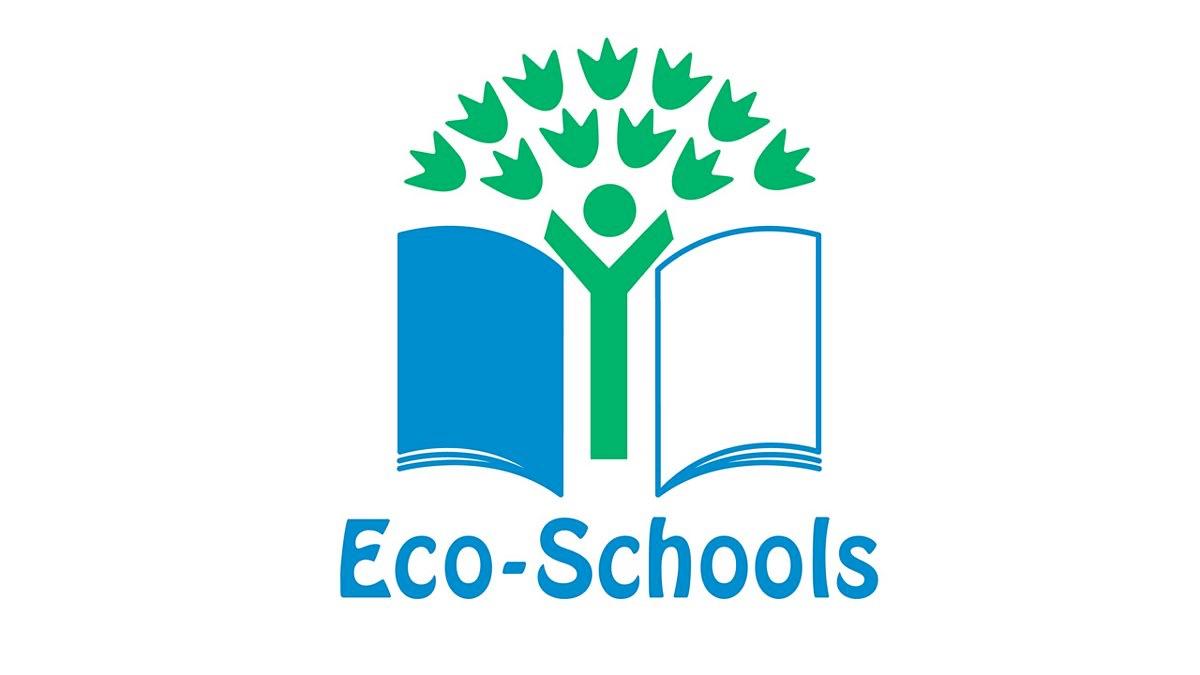
This half term has seen some new challenges in our quest to improve our environmental credentials at school. However, as an eco-committee we are always looking for ways to improve our plastic, waste and biodiversity. If you have any suggestions please send an email to Miss Bramhall or speak to an ecocommittee member. We will also be recruiting new eco-committee members in selected year groups, so look out for information if you would like to be involved.


Did you know? At Bolton School we currently send zero waste to landfill. Our mixed waste is sorted at destination rather than in school (this is why we don't have specific recycling bins at school). What can't be recycled is incinerated as refuse-derived-fuel.
What can you do? The three Rs we all know are far improved by adding an extra R. Can you help us reduce our waste through always thinking, from best to worst:
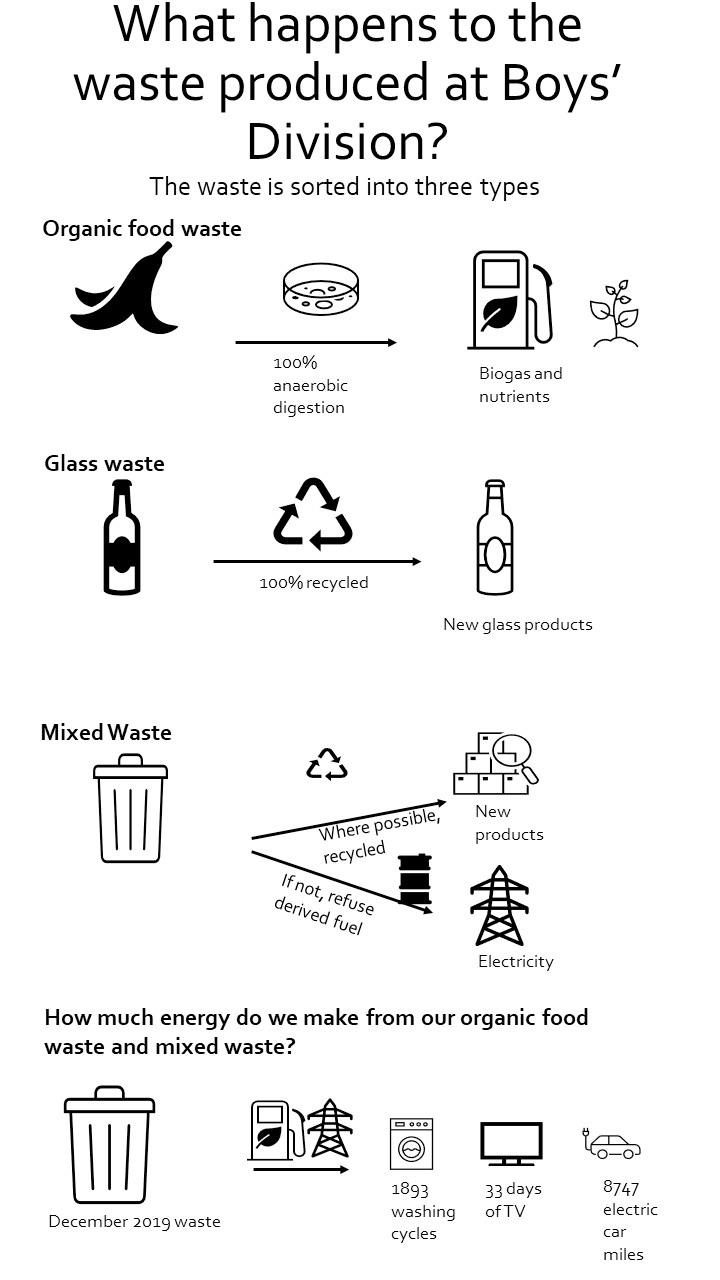
Refuse --> Reduce --> Reuse --> Recycle

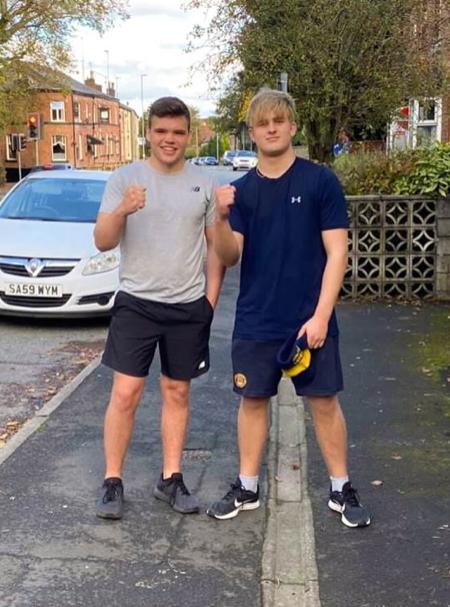


Sixth Form students Daniel Bentham and Piers Skeels-Caldwell raised £5,000 for charity with an endurance challenge that saw them run one mile every hour for a whole day.

Explaining why they were inspired to raise money for Cancer Research UK, they said: ‘We recognise the huge impact Covid will have on charities and therefore on progressing cancer treatments and research. A number of our friends and family have benefitted from new innovative cancer treatments and we know that research is key to that. We also know employed fundraisers are under huge stresses to maintain community funding given the economic impact of Covid.’
The idea of running 24 miles in 24 hours came about as the pair thought it would be an exciting challenge, which would stretch them both mentally and physically, and they knew that they could count on their school friends to support them by running a lap alongside them.
Daniel and Piers started the run at 4pm on Saturday 10 October and finished at 3pm the following day, after running one mile every hour even through the night. Describing the experience, they said: ‘We had originally planned to do the run in the summer months, but due to Covid restrictions we were prevented from doing it together. In recent weeks, a local
businessman, Ben Bate from Body Pro personal training, agreed for us to use his studio as a ‘run base’. This meant we could run to and from the studio and, more importantly, run together.
‘Having originally anticipated running in the summer, we were looking forward to the shorter nights. Running in October meant we ran twelve of the miles in the dark! Running in the dark was much harder. We were really lucky to be supported through the night by volunteer ‘lap runners’ including our school friends, family and members of sports teams we both play in. This kept us going. The 5am run was possibly the most difficult when the light still seemed a while off! The final lap came as a great relief and again we were grateful to those who ran with us.


‘We are obviously delighted to have raised the money we have and have been overwhelmed by the generosity shown. We are also grateful to Mr. Chilton (Boys’ Division PE teacher and Assistant Head of Sixth Form) and Mr. McGinty (Bolton School Water Polo Coach), who helped us publicise the event through various School Twitter accounts.’
Daniel and Piers are keen sportsmen: both are members of the school Rugby Union first VX, with Piers the Captain and Daniel Vice-captain of the squad. They have played rugby together both for School and as part of the Lancashire Rugby Squad since Year 7. Daniel also plays water polo and has captained his country while representing England Water Polo.


Mr. Ian Forgrieve, who is Head of Instrumental Studies, has been appointed to the Music Advisory Group of the National Children’s Orchestras of Great Britain (NCOGB). Together with a handful of other instrumental specialists from across the country, he will advise NCOGB’s management about repertoire choices and other activities. Over the summer holidays, NCOGB ran a very successful series of online masterclasses, webinars and recording projects involving over 450 children aged 7-14. This NCOnline project was to replace the residential courses, which had to be cancelled due to Covid. NCOGB is an institution which Ian has been involved with as a percussion tutor for several decades. Further information about the NCOGB organisation can be found at: www.nco.org.uk.
At Bolton School, Ian is responsible for managing the team of 22 visiting specialist instrumental and vocal teachers. He coordinates the exam entries for the Associated Board of the Royal Schools of Music and Trinity College London, and was a consultant for the creation of the latest ABRSM Percussion Syllabus. As a percussion specialist, in addition to giving one-toone percussion lessons, he directs the Samba Band, Drum Corps, Tuned Percussion Ensemble and Steel Pans Group, often writing the music for those groups. He performs in the band for school productions and concerts. Ian also teaches Year 7 and Year 8 class Music and he has been a percussion tutor at the Royal Northern College of Music Junior Department for over 30 years. Prior to working at Bolton School, Ian played professionally with many of the UK’s finest orchestras, including the BBC Philharmonic, Hallé, Manchester Concert Orchestra, London Philharmonic, London Sinfonietta, BBC Scottish Symphony Orchestra and Scottish Chamber Orchestra - performing in prestigious venues throughout the UK, Europe and the USA, broadcasting on television and radio, and playing on many commercially available CDs.

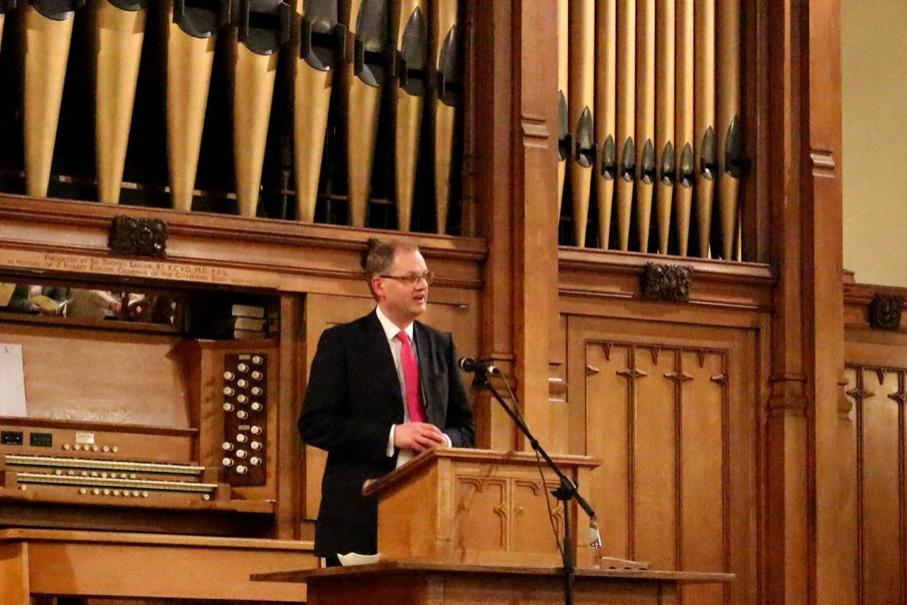
In September, Mr. Britton, Headmaster, gave the traditional Leverhulme Birthday Assembly, through which the School marks the anniversary of the start of the Bolton School Foundation in 1915. The occasion provides an opportunity for pupils to find out more about William Hesketh Lever, who became the first Viscount Leverhulme, and his life and times. This year, however, the focus was slightly different.
A senior Monitor read from the book ‘Leverhulme’s Legacy’, including this quote: ‘his father, James, had a deep concern for the spiritual and material improvement of the communities in which they lived and these values inspired William.’
The Headmaster then asked, ‘How did the boy inspired by these values become the man whose statue at Port Sunlight was on the list to be toppled at the height of the Black Lives Matter movement?’

Mr. Britton reminded boys of his assembly in the Summer Term, which focused on condemning racism and raising awareness about the Black Lives Matter movement. He went on to relate Lever’s links to events in the Congo in the early 1900s, including forced labour in palm oil plantations, as well as the housing, hospitals and schools he built in the eponymous town of Leverville, which is now Lusanga.

He compared this to two of Lever’s other projects: first the northern isles of Lewis and Harris, where Lever sought to mechanise and improve the fishing industry and where there is still a place called Leverburgh; and Port Sunlight, where he built housing for the workers in his soap factory.
Port Sunlight was arguably the most successful. Contemplating why, the Headmaster suggested that it was because Port Sunlight was a new venture: soap manufacture was novel and Lever was not replacing a way of life but inventing it. In contrast, in the Congo and Scotland, people had harvested and fished for generations. Lever was replacing their way of life and the changes, even if meant to be for the better, were imposed upon the community.
Mr. Britton reminded the boys that their aim should be to ‘go out and make a difference for good’. He said: ‘What we learn from our Founder this year, as we celebrate his birthday, is that you cannot do good to people, by imposing your will, however well intentioned. You can only do good with people, understanding their way of life, their thoughts and their needs.’
The thought for the day shared during the assembly by Vicecaptain Thomas Britton was a quote from US President Abraham Lincoln, taken from an executive order later called the Emancipation Proclamation: ‘All persons held as slaves shall be thenceforward forever free.’ The order was passed on 22 September 1862, 158 years ago to the day when the assembly
was held. Thomas went on to speak poignantly about the historical context of the Proclamation, referring to the inhumane treatment of slaves, as well as acknowledging that work is still needed today. He said: ‘We cannot imagine the horrors slaves went through … but the President in that moment empathised with all those millions of people, and changed their lives with a flick of his pen, granting them dignity, humanity and freedom. While there was a lot more work to be done, this was the beginning of a long road to freedom and equality that is still not complete.’


In June 2020, in the wake of the global discussion sparked by the Black Lives Matter (BLM) movement, a group of alumni and other members of the School community wrote an open letter to the Headmaster and Headmistress urging the School to review and improve its practices and make a sustained commitment to antiracism.

Since that letter was received, a number of positive actions pursuant to that aim have now been instigated, including:
• A potential lead advisor for the School’s planned consultation on the issues of diversity and inclusion across the Foundation has been sourced, as have promising contacts for staff training in related matters. Girls’ Division Senior School staff had the first tranche of this training during their recent INSET sessions, on the subject of Diversity and Unconscious Bias, which was very well received and has led to numerous avenues for further exploration;
• Both Divisions have reviewed their PSHE curriculum, in order to ensure that they meet fully the Independent Schools’ Inspectorate’s regulations on matters of diversity and inclusion• In the Girls’ Division, a curriculum audit was completed during the
Summer Term outlining areas which embraced issues designed to bring BIPOC, BIWOC and BAME identities to the forefront of girls’ consciousness. This audit was subsequently analysed and discussed by the Girls’ Division’s SMT and Heads of Department, who noted the following positive changes and areas for improvement:
o Year 10’s development of a PSHEE session for use across the School;
o Changes in the History curriculum, which have led to a greater emphasis on diversity;
o Changes in the English examination specifications, which have led to reduced emphasis on diversity in exam years;
o Dominance of white males in Science specifications;
o Necessity to ensure increased diversity of speakers invited to attend enrichment or careers events.
• In the Boys’ Division, Heads of Department have embarked on a full curriculum review intended for completion by the end of the
Autumn Term. Some immediate changes have already been actioned, including:
o The repurposing of a Year 8 ‘Language in the Media’ unit of teaching to be focused on the BLM movement, racial diversity and inclusion;
o A change to a Year 12 option choice in English in order to explicitly focus on those same issues;
o A Year 9 History module will now focus on American politics from the era of slavery;
o The Geography department will teach boys about Lord Leverhulme’s activities in the Congo alongside their learning about his work at Port Sunlight.
• Topics of racism, representation and inclusion also remain at the forefront of the pastoral agenda:
o Returning to the topics discussed in his assembly addressing the Black Lives Matter movement in the Summer Term, in his recent virtual assembly marking Lord Leverhulme’s birthday, the Headmaster compared and contrasted Lever’s interventions in the Congo, the Hebrides and the Wirral, at Port Sunlight.
o In his ‘Thought for the Day’ in a recent virtual assembly, the Boys’ Division Vice-captain told boys about Abraham Lincoln’s Emancipation Proclamation of 1862, which outlawed slavery in the US;
o An exhibition of facsimile photographs from the highly regarded exhibition at the National Portrait Gallery, The Missing Chapter, will be displayed in the Boys’ Division to mark Black History Month. The exhibition highlights the lives and experiences of African, Caribbean and South Asian people in the UK during Victorian and Edwardian times, linking well with the historical origins of the current Foundation.
As noted in the Headmaster and Headmistress’ response to the open letter, the School is determined that its response to the issues raised by the BLM movement should be meaningful and have a longterm impact on the culture of the School. Whilst much positive change has already taken place, there clearly remains further work to be done, not least the School’s consultation on issues of diversity and inclusion.
The commencement of this Foundation-wide consultation has been regrettably but unavoidably delayed by the significant resource and planning which has been required to ensure the School was able to reopen to pupils in a Covid-secure manner in time for the start of the new academic year.
Despite this delay, the Foundation’s commitment to improving its approach to diversity and inclusivity remains absolute. We continue to welcome the contribution of alumni, pupils, parents and all other members of the School community in this work and would again encourage anyone who wishes to engage with this process to share their experiences, in confidence, by emailing BLMConsultation@boltonschool.org.


the town at large. Activities looked back into history and looked forward into the world we might want to build.
On National Poetry Day, poet Andrew McMillan, in conjunction with Bolton School Boys’ Division, has launched a poetry workshop for children aged 11-18 years and their teachers and a subsequent competition for children aged 5-18 years across the borough. The competition will relate to the National Poetry Day theme of ‘Vision’. The award-winning poet said: “I’m excited to see what the brilliant minds of Bolton come up with for this challenge; poetry has a unique way of capturing the contemporary moment, of keeping a record of things we’ll look back on in years to come so others can learn about what living through this time was like. This is a chance for young people to put onto to the page how they have felt, how they have lived, what they’ve missed and what they’re hoping for, in these unprecedented times.”
Andrew ran a free online workshop via Zoom on 14th October in which he encouraged young people to explore new ways of looking, seeing and imagining the world. Pupils and staff were guided through new writing techniques to explore the world around us, from private spaces in the home, to local streets and
The poetry writing competition for Bolton schools will now launch and entrants will have a month to write their piece, which will be judged by Andrew McMillan. Entries must be submitted by Thursday 12 November and winners will be announced later that month. All entrants must pen an original poem, which should then be submitted by their school. Schools can submit multiple entries via the competition email address below. All entries must be accompanied by an entry form. It is not necessary to attend the workshop to enter the competition.
The Secondary School challenge for 11-18 year olds asks entrants to write a poem with an unusual point of view; maybe your poem will look at things slightly askew, maybe it will be a poem from the point of view of an inanimate object, perhaps it will present a kaleidoscope of lots of different views at once. Try to surprise yourself with your approach - move away from the idea that a poem is just a poet looking at someone or something and describing it.

The Primary School challenge for children aged 5-10 years will ask girls and boys to think about something you see every day. You might think about something small such as your bedside lamp or a spoon in the kitchen cutlery draw or it might be something big like a particular tree at the end of your street or your school building. Now, imagine that one day, it vanishes. Try to write about the disappearance. Alternatively, you could write about something you would like to replace the item you select with.
His second collection, playtime, was published by Jonathan Cape in 2018; it was a Poetry Book Society Recommendation for Autumn 2018, a Poetry Book of the Month in both The Observer and The Telegraph, a Poetry Book of the Year in The Sunday Times and won the inaugural Polari Prize.
Andrew's latest collection, pandemonium, will be released in May 2021. He is senior lecturer at the Manchester Writing School at MMU and lives in Manchester.
A winning entry and two runners-up will be selected in each category and they will be invited to tour the new Manchester Poetry Library in 2021. They will also receive book tokens to the value of £50 and £25. Winners will receive a collection of poetry books for their school library. Winning, running-up and highly commended entries will be published in digital and print Revisioning Poetry anthologies. To register your setting, receive supporting resources and an entry form, email boltonpoetry@boltonschool.org.
Andrew McMillan’s debut collection physical was the first ever poetry collection to win The Guardian First Book Award. The collection also won the Fenton Aldeburgh First Collection Prize, a Somerset Maugham Award (2016), an Eric Gregory Award (2016) and a Northern Writers’ award (2014). In 2019 it was voted as one of the top 25 poetry books of the past 25 years by the Booksellers Association.
* Andrew's photo comes courtesy of Urszula Soltys

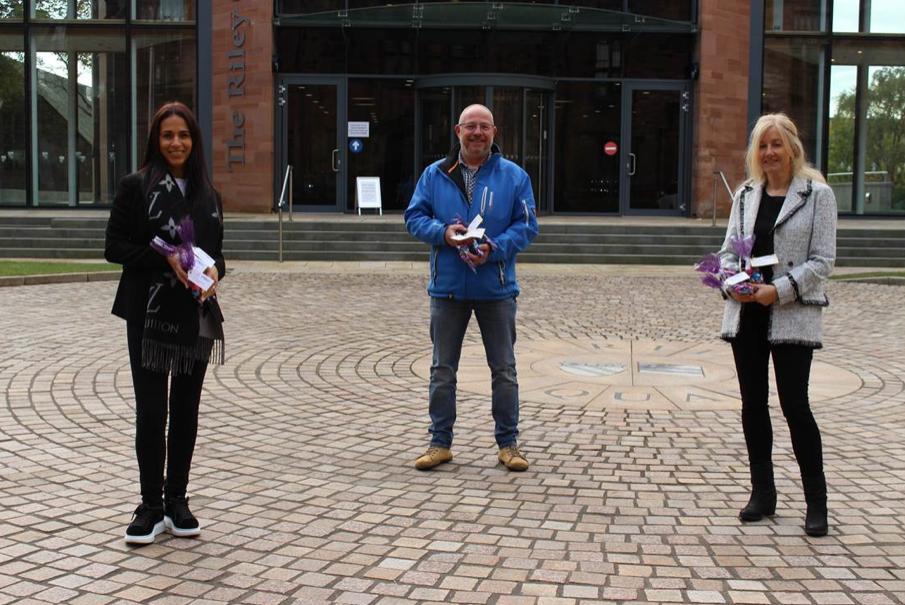
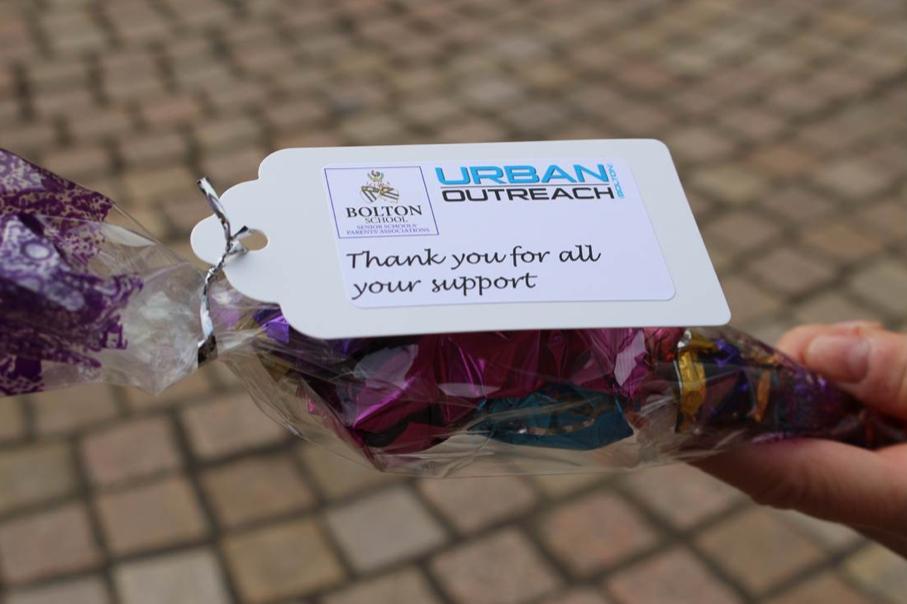
Dave Bagley of Urban Outreach is a regular visitor to Bolton School as he collects food items, particularly at Harvest and Christmas, to help those in need in the town. This week he has been back in the Girls' Division collecting packet and tinned food items from Senior and Junior Girls and from the Junior Boys' School as well as a financial contribution from the School's Infant School. However, recently, he collected 140 cones of chocolates, initially intended for the School's fundraising Summer Ball, which is organised by the Parents' Associations.
Dave said: "We are always amazed at the efforts that children and parents at Bolton School go to in order to support our campaigns. The last six months have been very intense as we have helped over 40,000 families in the town. The chocolates will be used to thank our volunteers and supporters. I look forward to being in school again next week to pick up the food produce that is being collected."

A diverse range of gifts and experiences donated by local businesses, which would have been auctioned on the night of the Summer Ball, are now being auctioned online by the PA.

Editor: Miss K.S. Wrathmell
Contributors: Mr. M. Power, Mr. J. Newbould, Miss A. Bradshaw, Miss E.A. Bramhall, Mr. I.K. Forgrieve, Miss N.R. Lord,
